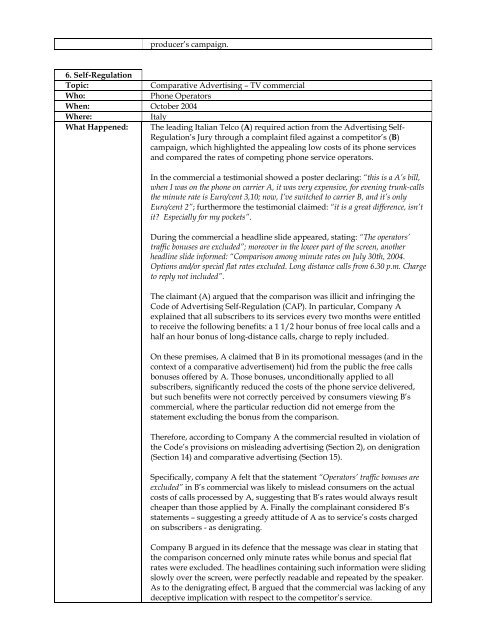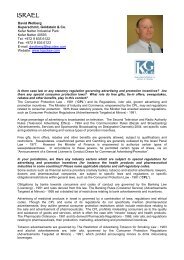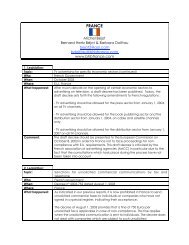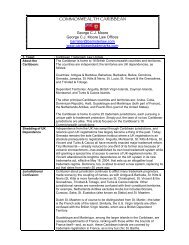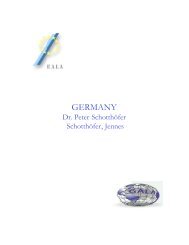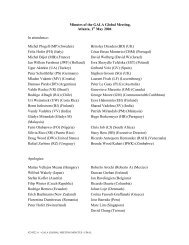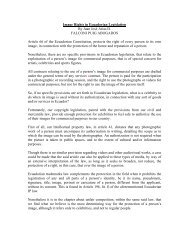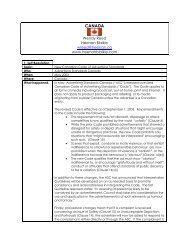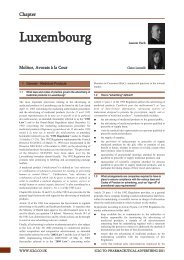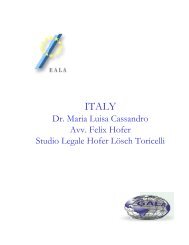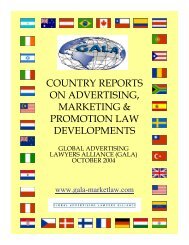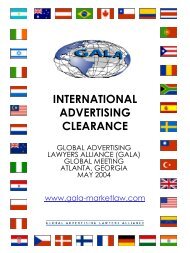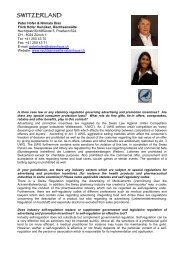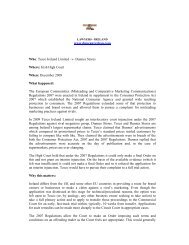list of contributors - GALA
list of contributors - GALA
list of contributors - GALA
Create successful ePaper yourself
Turn your PDF publications into a flip-book with our unique Google optimized e-Paper software.
producer’s campaign.<br />
6. Self-Regulation<br />
Topic: Comparative Advertising – TV commercial<br />
Who: Phone Operators<br />
When: October 2004<br />
Where: Italy<br />
What Happened: The leading Italian Telco (A) required action from the Advertising Self-<br />
Regulation’s Jury through a complaint filed against a competitor’s (B)<br />
campaign, which highlighted the appealing low costs <strong>of</strong> its phone services<br />
and compared the rates <strong>of</strong> competing phone service operators.<br />
In the commercial a testimonial showed a poster declaring: “this is a A’s bill,<br />
when I was on the phone on carrier A, it was very expensive, for evening trunk-calls<br />
the minute rate is Euro/cent 3,10; now, I’ve switched to carrier B, and it’s only<br />
Euro/cent 2”; furthermore the testimonial claimed: “it is a great difference, isn’t<br />
it? Especially for my pockets”.<br />
During the commercial a headline slide appeared, stating: “The operators’<br />
traffic bonuses are excluded”; moreover in the lower part <strong>of</strong> the screen, another<br />
headline slide informed: “Comparison among minute rates on July 30th, 2004.<br />
Options and/or special flat rates excluded. Long distance calls from 6.30 p.m. Charge<br />
to reply not included”.<br />
The claimant (A) argued that the comparison was illicit and infringing the<br />
Code <strong>of</strong> Advertising Self-Regulation (CAP). In particular, Company A<br />
explained that all subscribers to its services every two months were entitled<br />
to receive the following benefits: a 1 1/2 hour bonus <strong>of</strong> free local calls and a<br />
half an hour bonus <strong>of</strong> long-distance calls, charge to reply included.<br />
On these premises, A claimed that B in its promotional messages (and in the<br />
context <strong>of</strong> a comparative advertisement) hid from the public the free calls<br />
bonuses <strong>of</strong>fered by A. Those bonuses, unconditionally applied to all<br />
subscribers, significantly reduced the costs <strong>of</strong> the phone service delivered,<br />
but such benefits were not correctly perceived by consumers viewing B’s<br />
commercial, where the particular reduction did not emerge from the<br />
statement excluding the bonus from the comparison.<br />
Therefore, according to Company A the commercial resulted in violation <strong>of</strong><br />
the Code’s provisions on misleading advertising (Section 2), on denigration<br />
(Section 14) and comparative advertising (Section 15).<br />
Specifically, company A felt that the statement “Operators’ traffic bonuses are<br />
excluded” in B’s commercial was likely to mislead consumers on the actual<br />
costs <strong>of</strong> calls processed by A, suggesting that B’s rates would always result<br />
cheaper than those applied by A. Finally the complainant considered B’s<br />
statements – suggesting a greedy attitude <strong>of</strong> A as to service’s costs charged<br />
on subscribers - as denigrating.<br />
Company B argued in its defence that the message was clear in stating that<br />
the comparison concerned only minute rates while bonus and special flat<br />
rates were excluded. The headlines containing such information were sliding<br />
slowly over the screen, were perfectly readable and repeated by the speaker.<br />
As to the denigrating effect, B argued that the commercial was lacking <strong>of</strong> any<br />
deceptive implication with respect to the competitor’s service.


